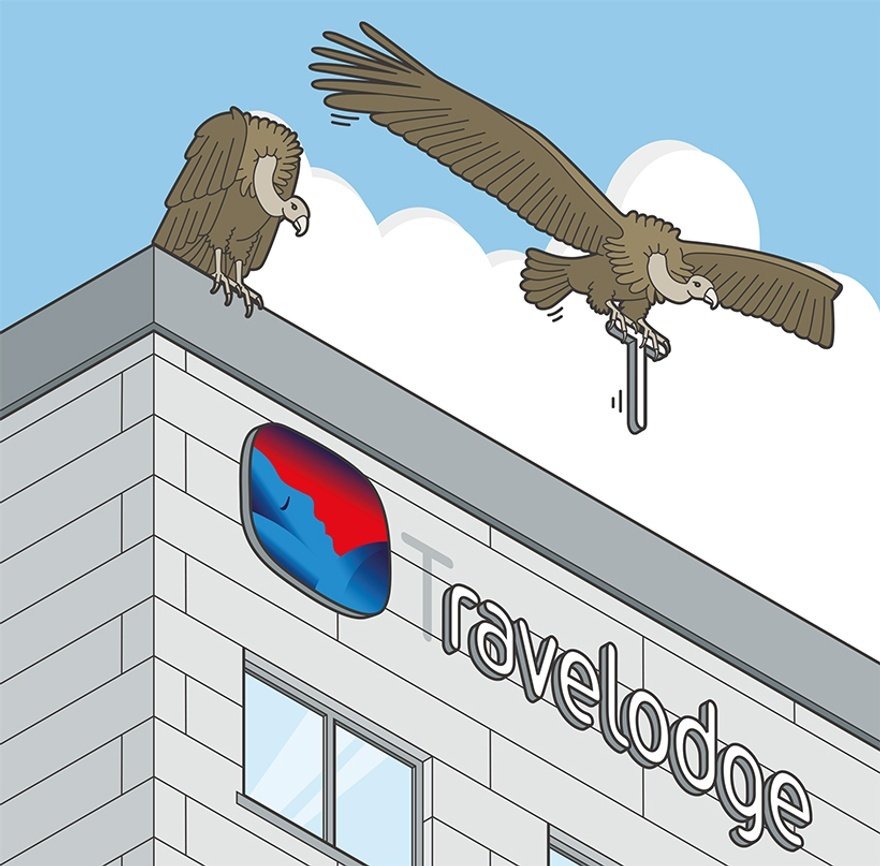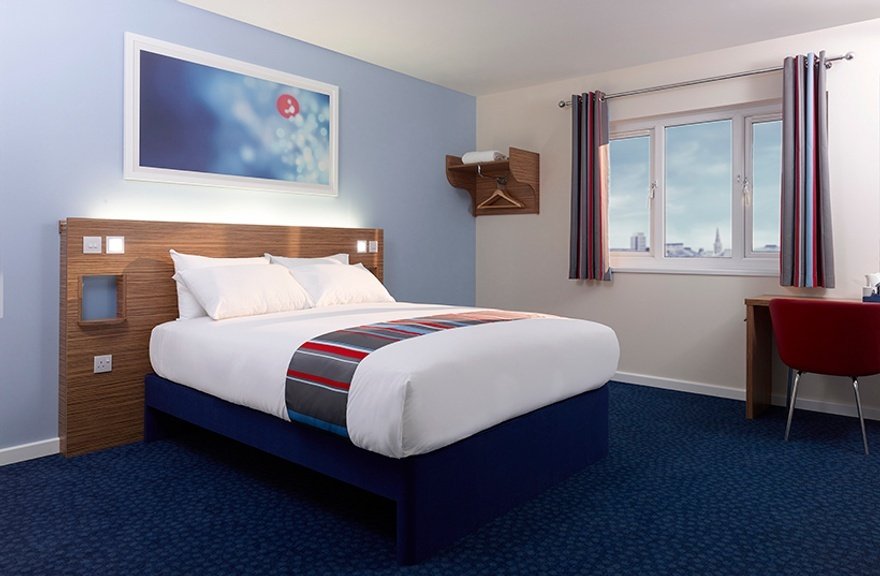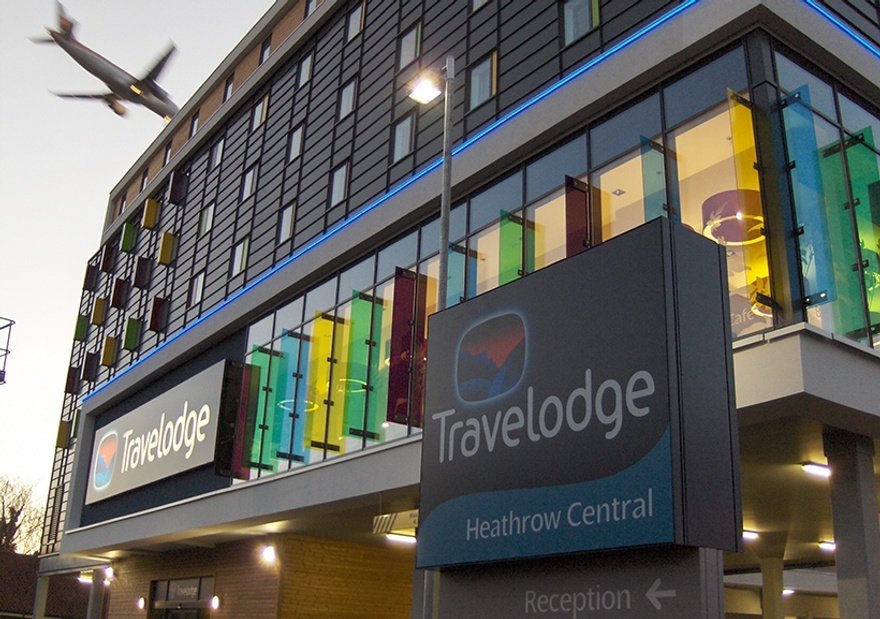Since March, Travelodge has been locked in a heated conflict with its landlords over rent reductions, culminating in a company voluntary arrangement. Landlords must now make a decision – stick with the brand they know or head for something new.
Zooming in from his home office, Viv Watts is adamant about one thing: "I didn't like conflict."
That might come as a surprise to anyone that has been following the Travelodge saga this year. As co-ordinator-in-chief of Travelodge Action Group – a disperse group of landlords battling rent reductions from the hotel group – Watts has been locked in a widely publicised fight with the hospitality giant. It's a spat that has seen landlords trying to take Travelodge to court, an acrimonious company voluntary arrangement (CVA), and a host of properties itching to rebrand.
The whole altercation is yet to run its course. When it finally does, it could not only redraw the UK's budget hotel map, but it could bring Travelodge to its knees. Make no bones about it – this is a conflict. And the stakes are high.
How high? Come the end of the year, as many as 400 hotels could leave the Travelodge group. An exodus of unprecedented scale in the hospitality industry, it could reduce the group's properties from 592 to under 200.
Rivals such as Accor are trying to convince landlords to exercise a break clause in their contract and rebrand. So is the grass always greener? Or is it a case of better the devil you know?
The beginning
In March, with global Covid cases spiking and a shutdown imminent, Travelodge wrote to Watts, who as managing partner of Oasis Holdings owns a single Travelodge site, to inform him that it wouldn't be paying its quarterly rent. In search of the bigger picture, Watts set about something that had not been attempted before: opening up a dialogue among Travelodge landlords – a disparate group of property owners and investors.
"I wanted to see if we were all being told the same thing," he explains. "Or if it was a case of little guys like me being ignored and taking the brunt of this while they pay the big guys."
The result was the Travelodge Owners Action Group, a coalition of close to 400 landlords painstakingly pieced together by Watts. From single property owners to investment groups with dozens of hotels, they could all agree on thing: Travelodge hadn't paid them rent and it hadn't explained when it intended to do so.
It took a further three weeks to get answers from the hotel group, which came in the form of a proposal to landlords to reduce rent by 80% for 2020, and 30% for 2021. The alternative, it stated, would be a CVA – a type of bankruptcy proceeding that would allow it to reduce its rents.
It's safe to say that Watts and his action group weren't impressed. "We all just kind of fell off our chairs. The proposal worked out to £146m of rent they wanted us to write off. And so we said: this is a CVA. Let's call it what it is." In the rancorous fallout, some landlords even tried to take the group to court for unpaid rent.
Travelodge's reasoning, according to the rent reduction proposal seen by The Caterer, was such: "Major hotel research analysts are forecasting up to a halving of hotel revenues in 2020, which, if applied to Travelodge, would represent a hit to trading of more than £350m, – approximately 10 times the level of impact seen in the 2008/09 global financial crisis."
To what extent the proposal equates to an outrageous request depends on who you speak to. "To be honest with you, I can't blame them for doing this," says Russell Kett, chairman of hotel consultancy HVS. "They're in a very similar position to quite a lot of hotel operators, in the sense that they've struck a deal with a landlord. They've approached their landlords and said, ‘we can't afford to pay the rent and here's what we propose'."
In answer to where this money should be found, some landlords are quick to point to both Travelodge's recent success – it posted £129m of earnings in £2019 – and its billion-dollar owners, investment bank Goldman Sachs and hedge funds Golden Tree Asset Management and Avenue Capital.
"We feel like Travelodge has made a huge amount of profit during the last seven years," one property owner told The Caterer anonymously. "Shareholders are using this tool [a CVA], which is really meant as a last resort for people who are at the brink of collapse, to get out of lease obligations."
The CVA
As the saga dragged on, deadlines to accept a deal came and went, until a CVA was finally issued on 3 June. "It was like a sigh of relief in a way," says Watts. "They couldn't have all the benefits of a CVA without actually going through with a CVA."
As the biggest creditors, the Travelodge Owners Action Group had the power not to vote it through. "Some [landlords] believed we could just refuse it and the shareholders would pony up the cash, as they don't want the company to collapse," says Watts. "I had a very different view. They'll let anyone else lose money before they lose money – that's the nature of being in equity. You're the last people to lose money."
Instead, Watts and his action group focused on getting key amendments into the CVA. The most important of these was a break clause, allowing landlords to terminate leases and re-let the hotels without penalty.
On 19 June, the CVA was passed. Terms included the company's owners using Travelodge's £100m of reserves and £40m in fresh cash to prop up the firm; 50% rent reductions through to December 2021 for 477 properties, and no rent for 37 loss-making hotels; and a break clause that hotels had to exercise before the end of the year.
For Watts and co, it was a chance to see if the grass was greener away from a group that had forced through two CVAs in eight years (the first coinciding with its change of ownership in 2012). Hotels had until 28 August to decide whether to stay with Travelodge in return for a lease extension, or 18 November to exercise their break clause (although for the 37 loss-making properties, this deadline is 31 December). Travelodge won't state how many of its hotels have extended, but Watts says that – at the time of writing – upwards of 400 could still take advantage of the break clause. And they aren't short of options.
The alternatives
Watts, for one, has been quick to set up a platform that he believes answers many of the inherent problems with the Travelodge model. He has helped launch Ago Hotels (see panel) – offering landlords the chance to move to Accor's Ibis brand, which already boasts 111 properties in the UK. Accor will act as brand operator (franchisor), with no involvement in the lease or ownership structure, and has agreed to fund rebrand costs. Rather than Travelodge's fixed-lease model, Watts has developed a hybrid-lease model that he believes will guarantee longevity and survivability in future recessions.
For Accor, the Travelodge fallout has been too good an opportunity to pass up. "This represents probably the most fantastic opportunity for us in the UK. It fits in perfectly with our business model," says Philip Lassman, vice-president, development, Accor Northern Europe. "The pandemic has shown the vulnerability of the fixed-lease model. It is rather strange and antiquated. Long-term viability is something that's ultimately the most important thing."
While Watts insists there is no minimum number of hotels required to launch the platform, he is quietly confident of 60 and would be pleased with 100.
Also vying for Travelodge landlords is Goodnight Hotels, a new brand launched in partnership with Village Hotels. It aims to offer landlords as close a product to what they originally had under their Travelodge lease, with 31-site UK operator Village Hotels providing the management and operational platform on a white-label basis. The aim is for a minimal rebranding requirement, the cost of which will be provided by Goodnight, and the new group is confident of launching with at least 80 hotels.
A Goodnight spokesperson says: "The major appeal for landlords is that, from a valuation point of view, the yields applied in the short- to medium-term to Travelodge will be significantly impaired. Indicative conversations with valuers have shown a good level of support for better capital values for the new brand. This therefore will offer landlords an excellent opportunity to protect against short-term income and short- to medium-term capital impairment."
The risks
Is there an inherent danger in switching brand, especially from a hospitality superpower such as Travelodge? Christine Hoddler, director of CHC Hotel Consultancy, says landlords should consider a number of factors: "Maintaining customer loyalty, the infrastructure that provides your reservations, your revenue management, your digital marketing – these are all things that one has to look at."
Is it a case that the bigger the brand you are moving to, the more the risk is mitigated? "It is. They have more hotels, so the distribution cost per unit is lower."
Of course, Travelodge will not let these hotels go without a fight. A proposal sent out to landlords in early August states why it believes it is a more attractive option. It lists the strength of the brand – with a 21% point lead in brand recognition over Ibis and a track record of significant year-on-year growth in revenues, revpar and EBITDA for the past seven years.
As well as the carrot, there is also the stick: Travelodge insists that all beds, carpet, bed linen and kettles will be removed from departing hotels. It is a move that a Travelodge spokesperson insists "every brand would do" in the circumstances, but which Watts claims is a tool to make it as difficult as possible to leave.
Come the end of the year, 400 landlords have the option: stay with Travelodge, or jump ship and rebrand? For Russell Kett, the answer should be in the projected balance sheets: "It all comes down to the numbers. Does the typical Travelodge owner feel more confidence in the projected performance of the Travelodge team versus the projected performance of the others?"
But for Watts, who has worked closely with many of these landlords, the issue is more emotive. "I think Travelodge is looking at it more as an Excel spreadsheet and landlords tend to be a bit more emotional. They have a longer memory than finance guys. They still remember the pain of the last CVA."
Travelodge is looking at it more as an Excel spreadsheet and landlords tend to be a bit more emotional
The future
If history has repeated itself once, could it happen again? "You've got to question the viability of the fixed-lease model," says Lassman. "How far away might a third CVA be for Travelodge? That's not a question I can answer. But if I was a landlord, I'd be very mindful of the fact that it still has a very large fixed-rents liability, and I don't think trading is back yet where it needs to be in order for you to cover that rent bill."
Watts is even more straight-talking: "You can almost picture a clever guy with a big Excel spreadsheet modelling out the rent profile for the next 20 years, and saying, ‘Well, if we have to do a CVA, then we have to do a CVA, otherwise the rents will be out of control'."
In the here and now Travelodge remains one of hospitality's biggest players. "It is a very good brand," says Kett's. "It does deliver bed nights and that is what you employ a brand to do. Owners should be very happy with the way that Travelodge has delivered business for them."
Owners should be very happy with the way that Travelodge has delivered business for them
For the landlords weighing up their future, will it be a case of – in Kett's words – "better the devil you know", or a CVA too far? If all 400 leave, what's the future for Travelodge?
"My suspicion is that if 100 leave, Travelodge will continue," says Kett. "But if a very significant number of that 400 defect, then that would seriously weaken the brand. It wouldn't disappear overnight, but it would have to curtail some of its activities. Nobody wants to join a brand that isn't growing."
So in a year's time, just what sort of Travelodge will we find? One of the hospitality's biggest brands, still continuing its recent growth, or a fallen giant licking its wounds? We'll know in just over a month.
The options on offer
Travelodge
Lease Full Repairing and Insuring (FRI) 25-year lease terms, with five-yearly rent reviews in line with inflation.
As part of the company voluntary arrangement, Travelodge offered landlords lease extensions in return for rent reductions through to 2022. The deadline to accept extensions was 28 August. Travelodge has not disclosed how many properties have taken this option.
Ago Hotels
Branding Ibis
Operator Accor will operate as a brand operator (franchisor)
Lease Fixed rent constituting 50% of the property's Travelodge rent. After the base rent is paid, 50% of the earnings before interest, taxes, depreciation and amortisation (EBITDA) will go to the landlord and the other 50% to Ago Hotels.
Possible launch size 60-100
Goodnight Hotels
Branding Goodnight Hotels
Operator Village Hotels, on a white-label basis
Lease New 25-year lease set at 1.7x rent/EBITDA and restructuring or rent costs, subject to CPI rent reviews. Hybrid leases available with a base rent and share of turnover. Goodnight benefits from six months rent-free for fixed leases, and three-month rent holidays for hybrid leases.
Possible launch size 80
The landlord's choice
One anonymous Travelodge landlord lays out their thinking on which path to take.
"We are a charity that invests in property and we own one Travelodge property. When the CVA happened, we were obviously very disgruntled. We went through the CVA with it in 2012, which was a joke. It's slightly more understandable at the moment – obviously Covid-19 has hit everyone extremely hard.
"We didn't want to move away from the lease structure that Travelodge is offering. AGO is offering a more flexible structure – but I haven't been told if it needs a certain number of hotels to make the venture viable, or how many it has lined up, so we felt there was a risk factor.
"It seems there's a lot more admin required in that, because you obviously want to stay on top of revenue, assessing why it might have slipped, discussing how you can spend money to drive more bookings – all of which works if you're an investment company, but as a charity we have very few staff and not much time. So we just look for something very easy to run that is low management.
"Goodnight Hotels – I don't know who's backing it or how viable what it is putting forward is. So we thought we couldn't risk the charity's money and leave Travelodge."
Continue reading
You need to be a premium member to view this. Subscribe from just 99p per week.
Already subscribed? Log In











